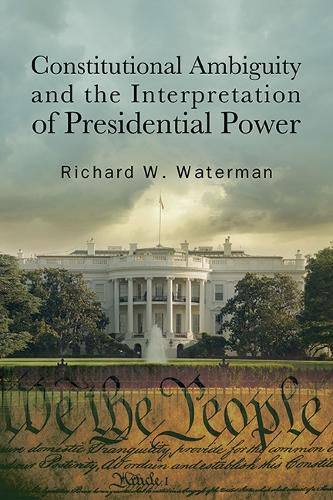Readings Newsletter
Become a Readings Member to make your shopping experience even easier.
Sign in or sign up for free!
You’re not far away from qualifying for FREE standard shipping within Australia
You’ve qualified for FREE standard shipping within Australia
The cart is loading…






Examines the role of constitutional ambiguity across the entire spectrum of American history and how it impacts our interpretation of presidential power.
While the rise of autocratic presidential powers has been widely noted by scholars in recent years, with calls by some for a stronger or more accountable presidency, Constitutional Ambiguity and the Interpretation of Presidential Power is among the first entirely dedicated to a study of the impact of this ambiguity on how scholars, judges, and presidents have understood executive power. Embarking on a detailed examination of legal, historical, and political science literature across the broad scope of American history, Richard W. Waterman examines the concerns of the Constitution's Framers regarding the fear of monarchy and a tyrannical president. He then discusses the writing and ratification of the Constitution and by drawing on insights from the time of the Framers to the present day, he provides a unique historical timeline related to the discussion and analysis of constitutional ambiguity. Over the course of several chapters, he finds that no sole theory defines presidential power, and ambiguity rules the day, allowing presidents to find power in the Constitution's silences as well as its various nooks and crannies, which has led to the very real danger of an autocratic presidency.
$9.00 standard shipping within Australia
FREE standard shipping within Australia for orders over $100.00
Express & International shipping calculated at checkout
Examines the role of constitutional ambiguity across the entire spectrum of American history and how it impacts our interpretation of presidential power.
While the rise of autocratic presidential powers has been widely noted by scholars in recent years, with calls by some for a stronger or more accountable presidency, Constitutional Ambiguity and the Interpretation of Presidential Power is among the first entirely dedicated to a study of the impact of this ambiguity on how scholars, judges, and presidents have understood executive power. Embarking on a detailed examination of legal, historical, and political science literature across the broad scope of American history, Richard W. Waterman examines the concerns of the Constitution's Framers regarding the fear of monarchy and a tyrannical president. He then discusses the writing and ratification of the Constitution and by drawing on insights from the time of the Framers to the present day, he provides a unique historical timeline related to the discussion and analysis of constitutional ambiguity. Over the course of several chapters, he finds that no sole theory defines presidential power, and ambiguity rules the day, allowing presidents to find power in the Constitution's silences as well as its various nooks and crannies, which has led to the very real danger of an autocratic presidency.